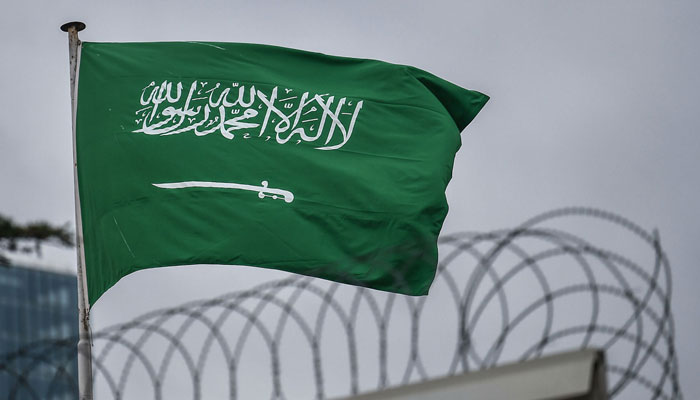Saudi Arabia announces relief package for calamity-hit people in Gwadar
Saudi envoy assured people that Kingdom of Saudi Arabia will help its Pakistani brethren in this difficult time
ISLAMABAD: Saudi Arabia has announced relief package for the calamity-hit people of Gwadar, where torrential rains have caused havoc, damaging hundreds of homes and rendering people displaced.
Saudi Ambassador Nawaf bin Saeed Ahmad Al-Maliky visited Balochistan and announced relief package for the calamity-ravaged people of the port city.
Announcing the relief measures, the Saudi envoy assured the people that the Kingdom of Saudi Arabia will help its Pakistani brethren in this difficult time.
Earlier, the Saudi envoy had a detailed meeting with Balochistan Chief Minister Sardar Sarfraz Bugti and ascertained the magnitude of losses. Ambassador Nawaf Al-Maliky announced 9,000 shelter camps and ration bags each for the Gwadar people.
After announcing the assistance, he chanted the slogans of ‘Pakistan Zindabad’ and ‘Pakistan-Saudi Arabia Bhai Bhai’.
Meanwhile, Balochistan Chief Minister Sarfraz Bugti paid his gratitude to the Kingdom of Saudi Arabia for announcing the relief package for the people of Balochistan. “Climate change is a huge challenge for all of us. Gwadar received record rains this year and we are trying hard to rehabilitate the victims,” said Bugti.
Gwadar was declared a calamity-hit area after torrential rains struck the port city. Prime Minister Shehbaz Sharif also visited the areas of the coastal city after assuming the office.
As many as 3,100 houses in Gwadar and 2,500 in Jiwani were damaged due to heavy rains. Besides, 95 houses were completely destroyed and more than 200 cattle were perished.
The officials said that 355 people were accommodated in the government residences and 800 people were rescued and shifted to their relatives’ homes. The Pakistan Army and Pakistan Navy established medical camps to provide health facilities to the victims.
-
 China Confirms Visa-free Travel For UK, Canada Nationals
China Confirms Visa-free Travel For UK, Canada Nationals -
 Inside Sarah Ferguson, Andrew Windsor's Emotional Collapse After Epstein Fallout
Inside Sarah Ferguson, Andrew Windsor's Emotional Collapse After Epstein Fallout -
 Bad Bunny's Star Power Explodes Tourism Searches For His Hometown
Bad Bunny's Star Power Explodes Tourism Searches For His Hometown -
 Jennifer Aniston Gives Peek Into Love Life With Cryptic Snap Of Jim Curtis
Jennifer Aniston Gives Peek Into Love Life With Cryptic Snap Of Jim Curtis -
 Prince Harry Turns Diana Into Content: ‘It Would Have Appalled Her To Be Repackaged For Profit’
Prince Harry Turns Diana Into Content: ‘It Would Have Appalled Her To Be Repackaged For Profit’ -
 Prince William's Love For His Three Children Revealed During Family Crisis
Prince William's Love For His Three Children Revealed During Family Crisis -
 Murder Suspect Kills Himself After Woman Found Dead In Missouri
Murder Suspect Kills Himself After Woman Found Dead In Missouri -
 Sarah Ferguson's Plea To Jeffrey Epstein Exposed In New Files
Sarah Ferguson's Plea To Jeffrey Epstein Exposed In New Files -
 Prince William Prepares For War Against Prince Harry: Nothing Is Off The Table Not Legal Ways Or His Influence
Prince William Prepares For War Against Prince Harry: Nothing Is Off The Table Not Legal Ways Or His Influence -
 'How To Get Away With Murder' Star Karla Souza Is Still Friends With THIS Costar
'How To Get Away With Murder' Star Karla Souza Is Still Friends With THIS Costar -
 Pal Reveals Prince William’s ‘disorienting’ Turmoil Over Kate’s Cancer: ‘You Saw In His Eyes & The Way He Held Himself’
Pal Reveals Prince William’s ‘disorienting’ Turmoil Over Kate’s Cancer: ‘You Saw In His Eyes & The Way He Held Himself’ -
 Poll Reveals Majority Of Americans' Views On Bad Bunny
Poll Reveals Majority Of Americans' Views On Bad Bunny -
 Wiz Khalifa Thanks Aimee Aguilar For 'supporting Though Worst' After Dad's Death
Wiz Khalifa Thanks Aimee Aguilar For 'supporting Though Worst' After Dad's Death -
 Man Convicted After DNA Links Him To 20-year-old Rape Case
Man Convicted After DNA Links Him To 20-year-old Rape Case -
 Royal Expert Shares Update In Kate Middleton's Relationship With Princess Eugenie, Beatrice
Royal Expert Shares Update In Kate Middleton's Relationship With Princess Eugenie, Beatrice -
 Andrew Mountbatten-Windsor’s Leaves King Charles With No Choice: ‘Its’ Not Business As Usual’
Andrew Mountbatten-Windsor’s Leaves King Charles With No Choice: ‘Its’ Not Business As Usual’




